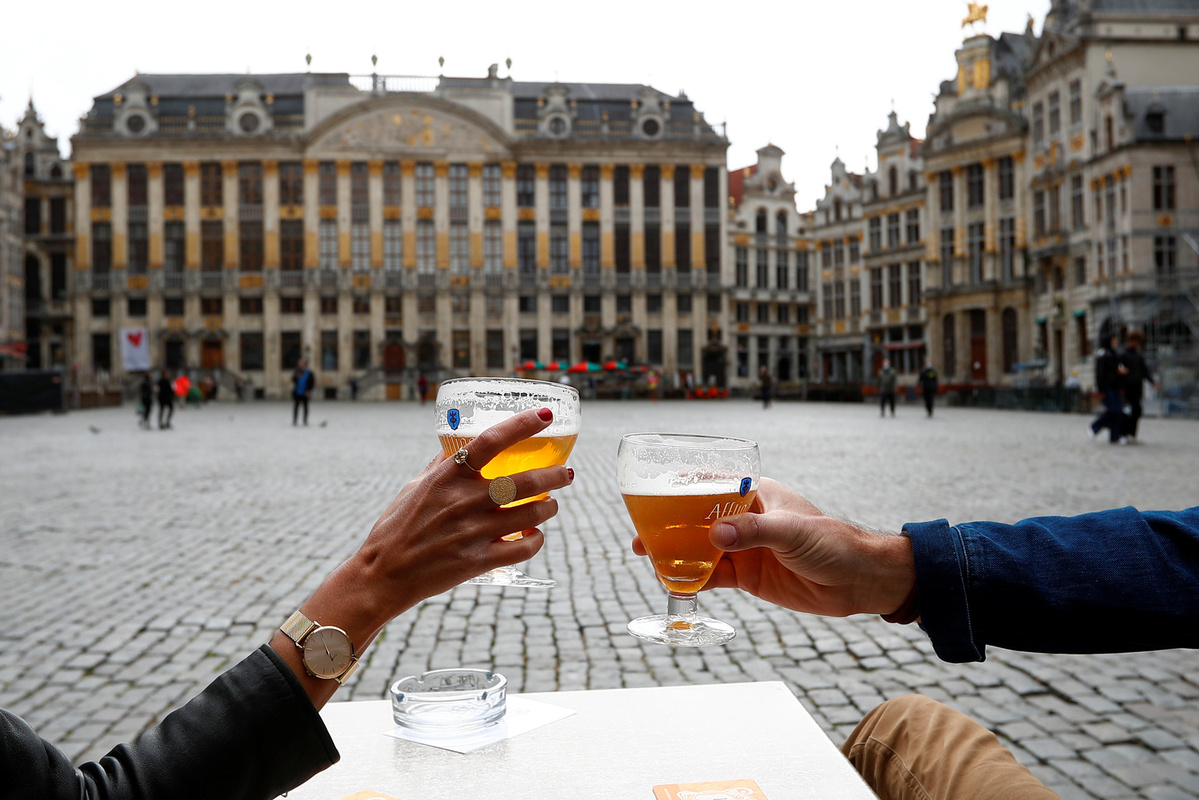EU seeks elusive funding on road to recovery

Agreement on money still appears unlikely
Editor's note: The world faces huge challenges during the COVID-19 outbreak, and maybe even greater ones when it is over. Here, in the 14th part of a series titled "One World, One Fight", we look at how countries can work together to fight the virus and meet the challenges when the pandemic ends.

The Grand Place in the heart of Brussels is Belgium's best-known and most photographed attraction, often swarming with tourists.
However, during the lockdown imposed since mid-March to prevent the spread of COVID-19, the square has been deserted, with all businesses closed and grass growing between the cobblestones.
On June 8, the Belgian government relaxed its measures, allowing restaurants, bars and shops to reopen, but still requiring social distancing of 1.5 meters. People were also urged to wear face masks.
On Saturday, many were enjoying the perfect weather-eating, drinking and chatting at outdoor tables in the square. Some sat on a cobblestoned sidewalk, while a few just lay on the ground looking up at white clouds in the blue sky.
But huge crowds of tourists were absent, including a rising number of tour groups from China in recent years.
Ilaria Maselli, vice-president of the board of directors at Visit Brussels, the city's tourism agency, said it is still hard to say how the recovery will take shape, such as the number of businesses reopening and how many others will file for bankruptcy. "Maybe we should talk again in at least a month to see some numbers," she said on Friday.
On June 8, Maselli went to a bar to have coffee with a friend to experience the city reopening.
During the lockdown, she cycled through some bar and restaurant areas. "The weather was fantastic then, but nobody was sitting outside. It really broke my heart," she said.
Maselli is worried about long-term uncertainty for the tourism industry, which she said employs 10 percent to 12 percent of the city's workforce. "We don't know what tourism will look like in the next few years," she said.
Paul Dujardin, CEO of BOZAR, Brussels' top arts and culture center, suggested that more efforts be made to encourage local tourism, as "there will be fewer Chinese coming to Brussels".
Chinese visitors are the eighth-largest major source of international tourists to Belgium, trailing several European Union neighbors and the United States.
To stimulate domestic tourism and economic recovery, the Belgian government is giving every resident 10 free train tickets for trips nationwide, effective from next month to the end of this year.
Other measures include a sales tax cut for the hospitality industry and a program to give workers tax deductible vouchers worth 300 euros ($338) to spend in restaurants and at cultural venues.
Hard-hit sector
Tourism, which is vital for many EU member states, has been among the sectors hit hardest by the pandemic. In 2018, it directly contributed 3.9 percent to GDP in the EU and 5.1 percent of the total workforce, or about 11.9 million jobs.
Thierry Breton, the European Commissioner for Internal Market, said in late April that the pandemic would result in losses for the tourism and travel industry of between 275 billion euros and 400 billion euros.
In its spring forecast released early last month, the European Commission predicted that EU economies would shrink by 7.4 percent this year in the worst recession in the bloc's history, compared with a 4.3 percent contraction in 2009 as a result of the global financial crisis. The commission has forecast a significant rebound next year.
Paolo Gentiloni, the European Commissioner for Economy, warned that "both the depth of the recession and the strength of the recovery will be uneven" for member states.
A former Italian prime minister, Gentiloni said disruption caused by the pandemic has resulted in a series of shocks to demand, supply, industrial output, investment, trade and capital flows. He warned that the recovery would be long and hard, and would not be seen in most EU member states until 2022 at the earliest.
The EU forecast that only Germany, Austria, Croatia, Slovakia and Poland are expected to see their level of economic activity in the final quarter of last year return by the end of next year. In contrast, the level of output in Italy, Spain and the Netherlands is forecast to remain more than 2 percent below that seen at the end of last year, Gentiloni said.
Latest data released early this month show that nearly 400,000 people in the EU lost their jobs in April despite aggressive government furlough programs to help many stay in work.
Gloomy headlines in recent weeks include: German airline Lufthansa stating last week it would cut 22,000 jobs; Irish budget airline Ryanair announcing a reduction of some 3,000 jobs, or 15 percent of its workforce globally; French carmaker Renault axing 15,000 positions worldwide; and European multinational plane maker Airbus stating it could cut up to 10,000 jobs.
























